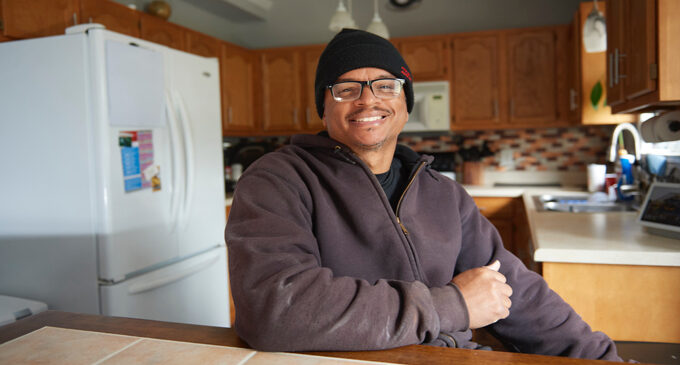Don Flow ready to join effort to scale up workforce housing
Mark McKinney, homeowner.

By John Railey
Don Flow knows a bit about scaling up operations, having helped expand his family business to 44 automotive dealerships spread across ten cities. He also has a passion for meeting a looming crisis for Winston-Salem/Forsyth County, that of creating thousands of units of affordable, or workforce, housing over the next decade.
“If we could seize this moment, we could be one of those stellar cities for the next generation,” he told me recently. “Could this be a moment in time when we might act in a concerted effort?”
As housing prices surged 16% this year, according to Redfin.com, workforce housing for police, firefighters, restaurant, hospital and biotech workers, to name a few, has gotten harder to find. One avenue has been the Forsyth County Homeownership Program, which has helped hundreds of local residents buy homes over the last 20 years. But with only a few dozen homeowners helped per year, it’s a drop in the bucket relative to the shortage of housing.
Winston-Salem State University’s Center for the Study of Economic Mobility (CSEM) has extensively studied the county program. Scaling it up, as well as other local ones, would play a key role in meeting the workforce housing challenge. By way of full disclosure, CSEM is applying for grants to support its research on that effort.
Public money is available for the effort. Councilman Jeff MacIntosh said Mayor Allen Joines has proposed $20 million from American Relief Plan Act (ARPA) funding to go for affordable housing, and MacIntosh believes the council will sign off on that proposal. The state of North Carolina has allocated an additional $10 million to the city for affordable housing, he said, and more than $1 million may be available for affordable housing from bonds approved in 2018. Forsyth County has about $20 million left in ARPA funding, and some of that could potentially go to further support the homeownership program, staff and commissioners indicated at a March meeting.
Flow said he is committed to helping, but he emphasized that he’s just one of many participants needed. “Everything we have been able to do to create a different future for our city the last 20 years has come from a wide network of people and institutions collaborating on the effort,” he said.
What’s needed is neighborhoods of 30 houses or more being repeated across the city and county through public/private partnerships. One example is the Berry Garden housing development in Kernersville. The county homeownership program worked on it with the Housing Partnership of Winston-Salem/Forsyth County, which took the lead role. More than 20 years after its inception, the neighborhood is thriving.
One resident, Mark McKinney, said he bought his house in 2003 for $109,000 and its market value is now $218,500. “It’s amazing,” said McKinney, a truck driver. The neighborhood has held up well, he said, it’s almost crime-free and he likes his neighbors.
Dan Kornelis, who helped start the county program when he was the head of the county’s community and economic development department, said, “The truth is that the program provided a template for success, but the real work was done by the participants who purchased their homes and who have continued to stay in their homes, building equity and wealth.”
CSEM’s findings on 508 program clients found they averaged $50,000 in equity over ten years, with fewer than 8% of homes foreclosed on, while bringing in more than $6.2 million in tax dollars to the county.
The challenge for scaling up the program, Flow said, is leveraging institutions already in place and involving builders, bankers and many others. “If we want to be an affordable and desirable city for the future, we need to immediately put in place a plan to build 500 homes, and we don’t need to slow down until we cross 5,000 homes. If we do this, we will be known as a city that provides the opportunity for all of our citizens to thrive.”
One way to effect the scale-up may be applying business principles, such as the ones Flow has used:
*Stay focused on customer (homeowner) needs, which include building home equity and safe neighborhoods for homeowners.
*Set goals and measure progress toward them with hard data. Be transparent with how you are doing with all of your key constituents.
*Continue to reinvest in what is creating value and helping you realize your goals.
“We have the organizations with the skills to do this,” Flow said. “Let’s get started.”
John Railey, raileyjb@gmail.com, is the writer-in-residence for Center for the Study of Economic Mobility (www.wssu.edu/csem).











